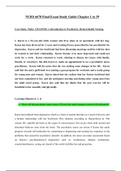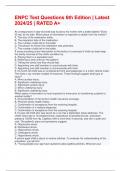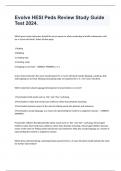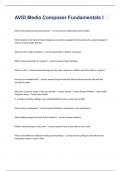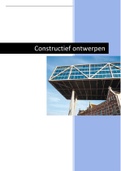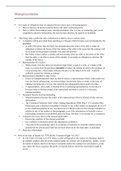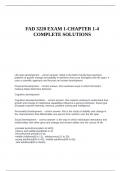Candidate Number: 8933
Dr Challoners Grammar School
Centre Number: 52205
Compare and contrast the presentation of the power dynamic between
genders in Tenant of Wildfell Hall by Anne Brontë with A Thousand
Splendid Suns by Khaled Hosseini.
Both Anne Brontë and Khaled Hosseini critique the unequal power dynamic
enforced by institutions and argue that the effects of this power dynamic is damaging
and threatening for women. Institutions, such as religious and legal systems, enforce
the patriarchy and consequently entitle men to psychologically and physically abuse
women without consequences. This leads to both women and men believing women
are inferior and as a result, men are given more importance and so, women’s power
to do anything is automatically reduced to below men’s power. The unequal power
dynamic manifests itself through Mariam, Laila and Helen’s inability to have freedom
from the perpetuating cycle of suffering, which both authors argue is morally wrong.
Despite this, both Brontë and Hosseini present women who are able to overcome
these boundaries and joyfully live out their lives: therefore the authors argue the
removal of the gender barriers would create a more moral society.
Both authors critique the institutions repressing women because they
manipulate people to be implicit in the oppression of women. Through her
delineation of Reverend Millward Brontë reveals the hypocrisy of parts of the Church.
He believes it was a ‘violation of her sacred duties as a wife’ to leave Arthur, despite
Helen doing it for the salvation of her son’s soul. Arguably the Church promotes piety
only if it benefits men, suggesting the church is enmeshed with the patriarchal
society. This hypocrisy is further emphasised by Huntingdon violating God’s laws by
harming Helen and acting in an ungodly manner but the Reverend still viewing Helen
as acting immorally. Brontë is revealing society’s use of institutions to justify men’s
actions as moral whereas women are seen as immoral if they rebel against men -
even if a man is acting immorally - reiterating that these institutions enforced the
patriarchy. Moreover, Brontë highlights religious devotion is not creating oppression,
as Helen’s religious beliefs give her the strength to escape her abusive marriage;
instead these institutions attempt to twist people’s religion so they become aligned
with the patriarchy. Equally, the Taliban justify their ruthless control and oppression of
women by arguing that the preciousness of women and their bodies needs to be
protected. However, the punishment for disobeying the women-specific laws are
1
, Abigail Edwards
Candidate Number: 8933
Dr Challoners Grammar School
Centre Number: 52205
being ‘beaten’, ‘stoned to death’ or ‘los[ing] a finger’. By juxtaposing the Taliban’s
declaration of women’s bodies as precious with the brutal forms of punishment,
Hosseini is portraying the use of religion to justify the oppression of certain groups of
individuals, such as non-Muslims and women. Additionally Hosseini never explicitly
criticises the regime, but merely demonstrates how ‘under Taliban rule women have
been stripped of their visibility, voice and mobility’1. He reveals how the patriarchal
society is devastating and destructive for women through the hardships of the two
individual protagonists. This is similar to Brontë’s views in the preface where she
explains ‘I wished to tell the truth, for the truth always conveys its own moral’2. Both
authors are attacking institutions which suppress women and attempt to curtail
women’s power in a potent manner by telling the stories of individuals, whose
experiences are prevalent throughout their societies.
Brontë and Hosseini further demonstrate that the perpetuation of oppression by
these institutions means many women internalise the patriarchal society as ideal,
leading to most people in these societies believing that the oppression of women’s
power is desirable. One example of this is Mrs. Markham as she believes there are ‘
“household matters that every lady ought to be familiar with” ‘. Brontë has
demonstrated the entrapping nature of the domestic sphere for women with the
determiner, ‘ “every” ’ removing women’s ability to choose their occupation.
Furthermore, Mrs. Markham forces this view onto an incurious Helen as she judges
essential knowledge. Brontë is critiquing women who not only follow the patriarchal
society but also try to diminish other women’s power to choose their path through
life. Whereas, Hosseini is more sympathetic towards women who allow society to be
perpetuated but still demonstrates that women should attempt to fight the patriarchy
by supporting other women. Mariam blames Laila for the marriage and declares ‘ “I
won’t have you cast me out” ‘, instantly creating distrust as Mariam attempts to
repress Laila, potentially due to the fact that she is unable to gain power anywhere
else. Yet when they become friends and create a strong bond they find power in
each other to make their lives more bearable. But Hosseini also demonstrates that
some women are overpowered and see no possibility of transcending the gender
1
Feminist Majority Foundation. Available at: https://feminist.org/. (Accessed: 9th December 2021).
2
Brontë, A. (1848) Preface in The Tenant of Wildfell Hall. 2nd edition. Penguin Random House UK.
2



